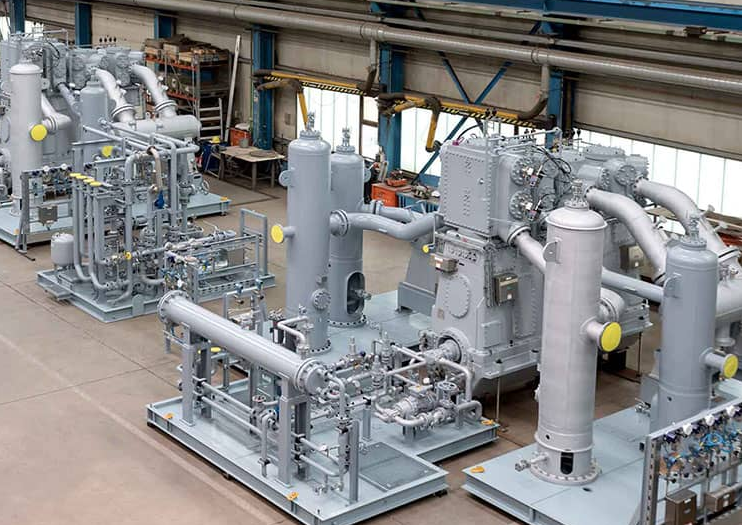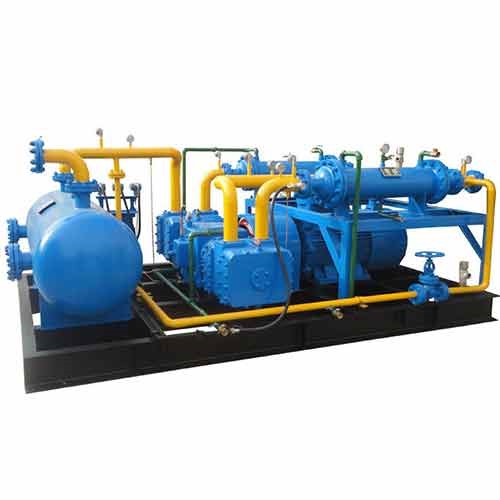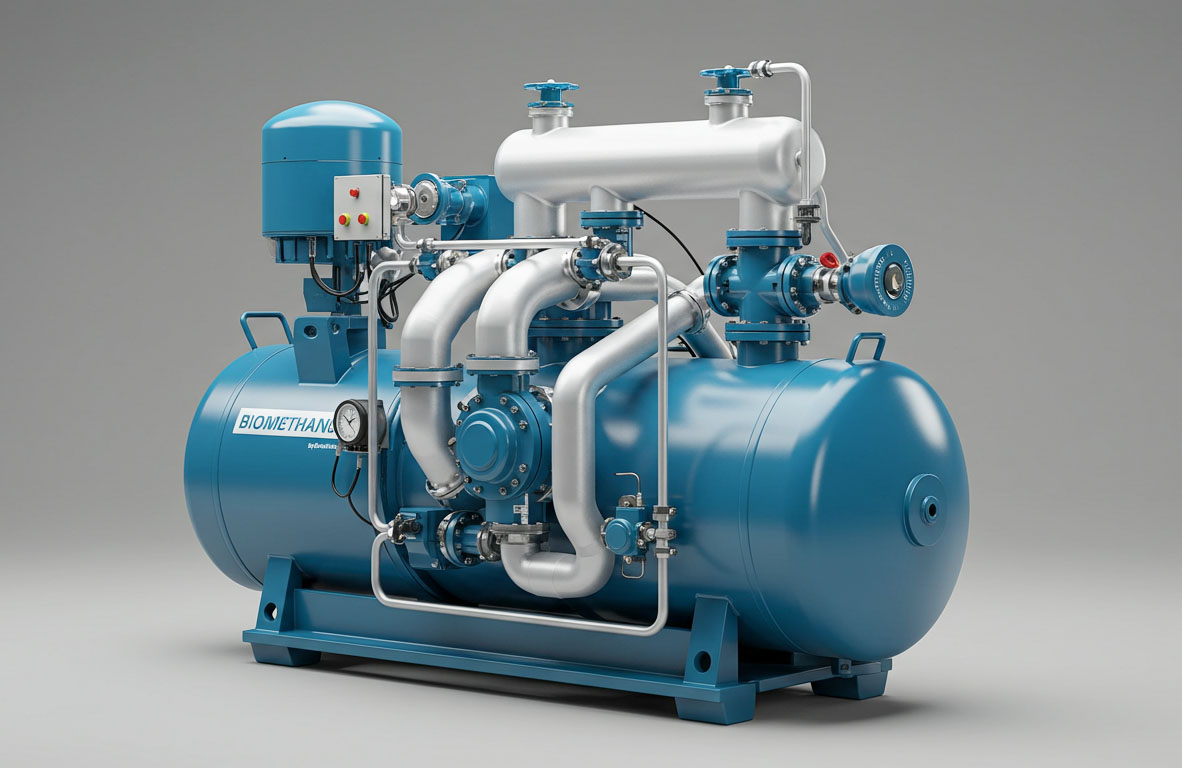Methane Gas Compressor: Boosting Efficiency and Safety

Introduction
Methane gas compressor, often referred to as natural gas, plays a pivotal role in various industries, including energy production, environmental applications, and more. Its significance arises from its clean-burning properties and widespread availability. To efficiently handle and distribute methane, the use of methane gas compressors is essential. In this comprehensive guide, we will delve into the world of methane gas compressors, exploring their types, applications, factors to consider when choosing one, maintenance, safety measures, and future trends.
Definition of a Methane Gas Compressor
A methane gas compressor is a mechanical device designed to increase the pressure of methane gas by reducing its volume. This compression process makes it easier to transport and distribute methane to various destinations. These compressors are integral in ensuring the efficient utilization of methane gas in different industries.
Importance of Methane Gas in Various Industries
Before we delve into methane gas compressors, it’s crucial to understand why methane is so important. Methane is a hydrocarbon gas, primarily composed of carbon and hydrogen atoms, with the chemical formula CH4. It is the main component of natural gas and is considered a valuable energy source due to its clean-burning nature. Methane is used in electricity generation, heating, cooking, and as a fuel for vehicles. It also has environmental applications, such as in landfill gas recovery and biogas production.
Role of Methane Gas Compressors in Handling Methane
Methane gas compressors are indispensable tools for handling methane efficiently. They increase the pressure of methane gas, allowing it to flow through pipelines or storage tanks with ease. This compression process ensures a reliable and consistent supply of methane to various industries and applications. Now, let’s explore the different types of methane gas compressors available.
II. Types of Methane Gas Compressors
There are three main types of methane gas compressors: reciprocating, rotary screw, and centrifugal. Each type has its unique working principle, advantages, and applications.
A. Reciprocating Methane Gas Compressors
1. Working Principle
Reciprocating compressors use a piston-cylinder arrangement to compress methane gas. When the piston moves, it creates a vacuum that draws in methane, which is then compressed when the piston moves back up.
2. Advantages
- High efficiency
- Suitable for high-pressure applications
- Reliable and durable
3. Applications
Reciprocating compressors are commonly used in natural gas processing plants and industrial applications where high-pressure compression is required.
B. Rotary Screw Methane Gas Compressors
1. Working Principle
Rotary screw compressors use two rotating helical screws to compress methane gas. As the screws turn, they trap and compress the gas between them.
2. Advantages
- Continuous and smooth operation
- Lower maintenance requirements
- Energy-efficient
3. Applications
Rotary screw compressors are often used in natural gas distribution systems and applications where a continuous flow of compressed gas is needed.
C. Centrifugal Methane Gas Compressors
1. Working Principle
Centrifugal compressors utilize a high-speed rotating impeller to accelerate methane gas, which is then converted into high pressure as it exits the impeller.
2. Advantages
- High flow rates
- Compact design
- Lower maintenance
3. Applications
Centrifugal compressors are suitable for large-scale natural gas transportation and storage facilities.
III. Applications of Methane Gas Compressors
Methane gas compressors find applications in various industries and sectors. Let’s explore some of the key areas where these compressors are essential.
A. Energy Sector
1. Methane as a Clean Energy Source
Methane is a vital component in the transition to cleaner energy sources. It can be used as a fuel for power generation, reducing greenhouse gas emissions compared to coal or oil.
2. Methane Storage and Distribution
Methane gas compressors are crucial for storing and distributing methane to power plants, industrial facilities, and homes.
3. Natural Gas Processing Plants
In natural gas processing plants, compressors play a central role in increasing the pressure of raw natural gas for transportation through pipelines.
B. Environmental and Biogas Applications
1. Landfill Gas Recovery
Methane is produced naturally in landfills as organic waste decomposes. Methane gas compressors help capture and convert this gas into a valuable energy source.
2. Biogas Production
Biogas, produced from organic materials like agricultural waste and wastewater, can be upgraded and compressed using methane gas compressors for various applications.
3. Emission Reduction
By capturing and utilizing methane emissions from various sources, including livestock operations and wastewater treatment plants, methane gas compressors contribute to reducing greenhouse gas emissions.
IV. Factors to Consider When Choosing a Methane Gas Compressor
Selecting the right methane gas compressor for your specific needs requires careful consideration of several factors:
A. Capacity and Flow Rate Requirements
The compressor’s capacity and flow rate should match the demand of your application. Consider factors like peak demand and future growth.
B. Energy Efficiency and Environmental Considerations
Efficiency is crucial to minimize operating costs and reduce environmental impact. Look for compressors that meet energy efficiency standards and have low emissions.
C. Safety Features
Safety is paramount when dealing with methane gas. Ensure that the compressor is equipped with safety features like pressure relief valves and emergency shutdown systems.
D. Maintenance and Serviceability
Consider the ease of maintenance and availability of service and spare parts when choosing a compressor. Regular maintenance is essential to ensure optimal performance and longevity.
V. Maintenance and Care of Methane Gas Compressors
Importance of Regular Maintenance
Regular maintenance is essential to keep methane gas compressors running smoothly. Neglecting maintenance can lead to downtime, reduced efficiency, and safety risks.
Recommended Maintenance Tasks and Schedules
Follow manufacturer-recommended maintenance schedules, which typically include tasks such as oil changes, filter replacements, and inspections of critical components.
Tips for Ensuring Longevity and Optimal Performance
- Keep the compressor clean and free from debris.
- Monitor performance parameters regularly.
- Train personnel in proper compressor operation and safety procedures.
VI. Methane Gas Compressor Safety Measures
Safety is of paramount importance when dealing with methane gas. Here are some key safety measures to consider:
A. Safety Precautions for Handling Methane Gas
- Use appropriate personal protective equipment (PPE).
- Ensure proper ventilation in compressor rooms.
- Follow safety guidelines for handling flammable gases.
B. Ventilation and Gas Detection
Install adequate ventilation systems and gas detection devices to detect methane leaks and prevent potential hazards.
C. Emergency Procedures and Training
Have clear emergency procedures in place, and provide training to personnel on how to respond to gas leaks, compressor failures, and other emergencies.
VII. Future Trends in Methane Gas Compressor Technology
The field of methane gas compression is ever-evolving, with several exciting trends on the horizon:
A. Advancements in Efficiency and Energy Savings
Ongoing research aims to improve compressor efficiency and reduce energy consumption, making methane compression more sustainable and cost-effective.
B. Smart Monitoring Systems for Improved Performance
The integration of IoT technology allows for real-time monitoring of compressor performance, enabling proactive maintenance and optimization.
C. Sustainable Practices in Methane Compression
As environmental concerns grow, there is a push towards developing more sustainable methane compression solutions, such as using renewable energy sources for compression.
VIII. Conclusion
Methane gas compressors play a crucial role in various industries, from energy production to environmental applications. Their ability to efficiently handle and distribute methane gas is essential for meeting the growing demand for clean energy and reducing greenhouse gas emissions. By considering factors such as capacity, efficiency, safety, and maintenance, industries can harness the power of methane gas compressors while ensuring safety and sustainability.
In conclusion, the significance of methane gas compressors in today’s world cannot be overstated. Their adoption is not only a practical choice but also a responsible one, contributing to a more efficient and sustainable future. Embracing methane gas compressor technology is a step towards efficient methane handling and distribution, benefiting both industries and the environment.


